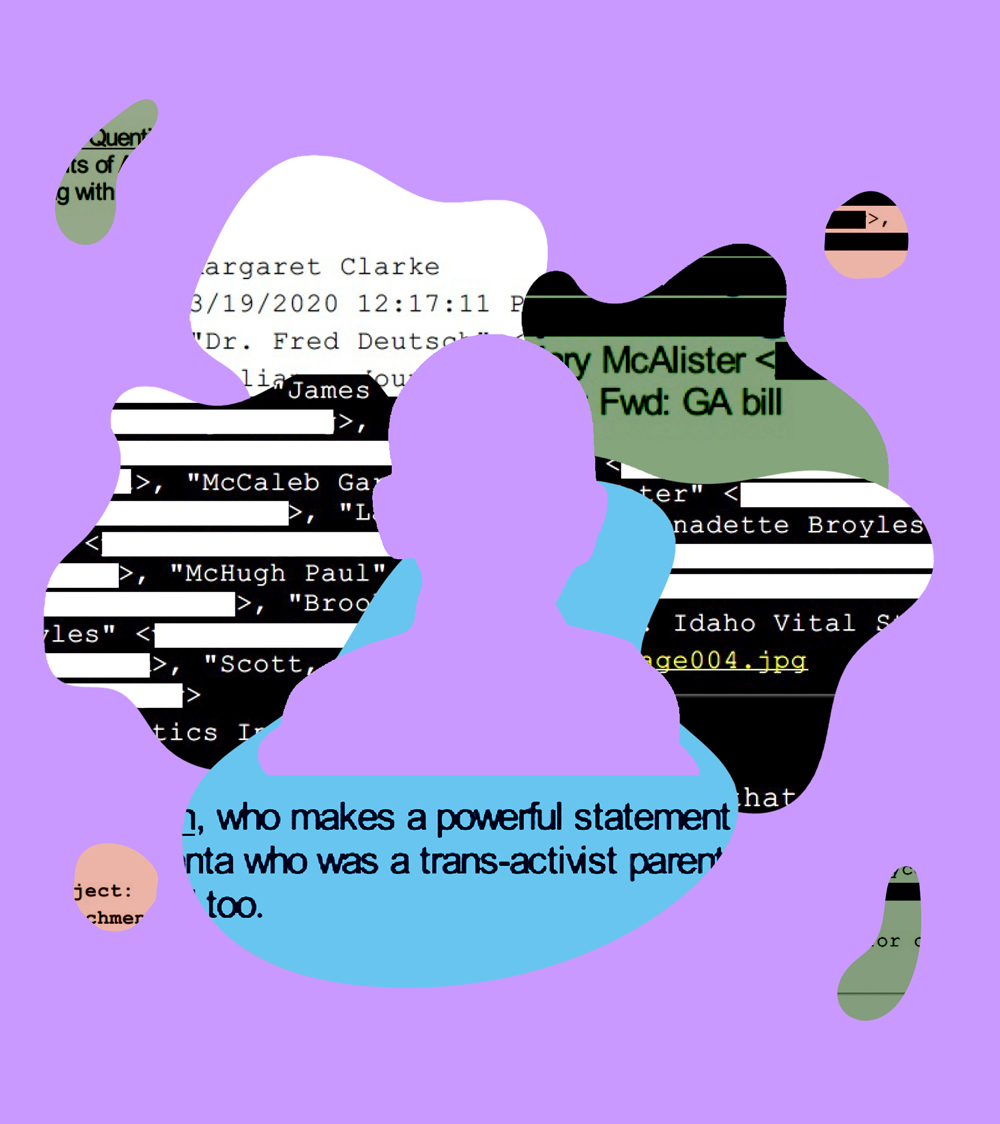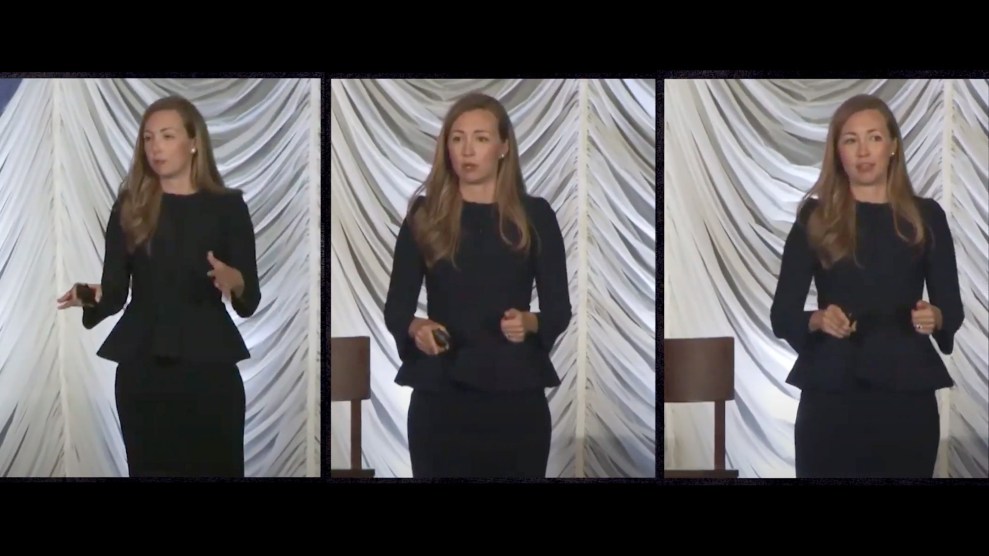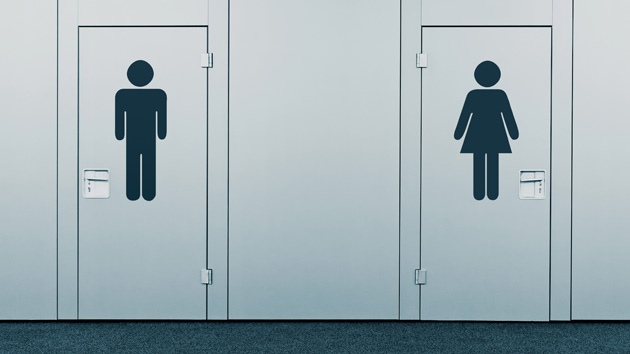Impact Update: After publication, this article was widely reported on and cited across a range of popular and academic publications, including the Guardian, New York Magazine, Vice and Vox. Pauly spoke about her investigation on NPR’s Here & Now. The story has been cited by local lawmakers in South Dakota who oppose the legislation, in testimony by advocates in Wisconsin seeking to block an anti-trans bill, and in 5th Circuit appeals litigation over a university’s canceling of a drag show. Other advocates have also made use of the reporting in research briefs, including the Movement Advancement Project and the National Women’s Law Center. In response to the article’s publication, an activist hacker released the full collection of leaked emails online, informing public debate as well as litigation over gender-affirming care bans.
On a Saturday afternoon in August 2019, South Dakota Republican state Rep. Fred Deutsch sent an email to 18 anti-trans activists, doctors, and lawyers with the text of a bill he planned to introduce that would make it a felony for doctors to give transgender children under 16 gender-affirming medical care. “I have no doubt this will be an uphill battle when we get to session,” Deutsch warned the group. “As always, please do not share this with the media. The longer we can fly under the radar the better.”
The message was one in a trove of emails obtained by Mother Jones between Deutsch and representatives of a network of activists and organizations at the forefront of the anti-trans movement. They show the degree to which these activists shaped Deutsch’s repressive legislation, a version of which was signed into law in February, and the tactics, alliances, and goals of a movement that has sought to foist their agenda on a national scale.
In messages back and forth, some members of the group pushed Deutsch to make the bill even more restrictive. Vernadette Broyles, the president and general counsel of a Georgia-based law firm called the Child & Parental Rights Campaign, urged him to raise the age threshold to 18. Broyles, who is also affiliated with the conservative Christian legal powerhouse Alliance Defending Freedom (ADF), warned that other religious-right groups might not support the bill if “you start by giving away 16 and 17-year olds right from the outset.” Others, including Andre Van Mol—a member of a fringe, conservative doctors group that calls itself the American College of Pediatricians (ACPeds)—raised concerns that the bill as written might backfire by accidentally blocking health care providers from “attempting to change…a child’s perception of their sex” when kids identify as transgender. Deutsch agreed to rewrite the section.
At the time, there was little precedent for such bills, and Deutsch’s legislation, called the Vulnerable Child Protection Act, was killed in the Senate after doctors showed up at the South Dakota statehouse to argue they should not be sent to prison for following the medical consensus. “Though our session in SD is now over and our efforts to protect gender-confused vulnerable children failed, I continue to receive ugly email and social media posts,” Deutsch complained to the group in March 2020.
“Please do not say that the South Dakota effort failed!!” Margaret Clarke, general counsel for the Alabama branch of the Phyllis Schlafly–founded Eagle Forum, replied. “You successfully inspired, encouraged and counseled numerous VCAP [sic] efforts around the country. You established the ideal witness list that we are all still following in our individual states…And, most importantly you connected us all to each other. This is just the beginning.”
Indeed, Deutsch’s bill has proved influential in the recent surge of anti-LGBTQ lawmaking. This legislative session, at least 18 states have considered bills containing language closely resembling the text of the Vulnerable Child Protection Act. The leaked emails reveal how Deutsch’s proposal helped proponents of the national movement to restrict gender-affirming care establish a playbook for their now-common attacks. “They’ve very much increased sophistication since then, but the roots are there,” says activist and writer Erin Reed, who tracks anti-trans legislation. Reed says that when she meets with legislators, they’re often surprised to learn of the outside forces pushing anti-trans bills. “This isn’t coming from an in-state grassroots support system,” she says.
The emails demonstrate close collaboration between groups working behind the scenes to push bills banning transgender health care, including ADF—which has defended state-sanctioned sterilization of trans people in Europe—and the ACPeds—which has opposed adoption by gay couples and supported conversion therapy for LGBTQ youth. In recent years, ADF has drafted legislation banning trans children from using school restrooms or playing on school sports teams that align with their gender identity. (Both groups are also staunchly anti-abortion; ADF, which drafted the Mississippi abortion ban at the heart of the case that overturned Roe v. Wade, is currently representing ACPeds in a closely-watched lawsuit to ban an abortion pill, mifepristone, nationally.)
“These are groups who we know are not interested in the best-practice care for trans kids,” says Cathryn Oakley, state legislative director and senior counsel for the Human Rights Campaign. “These bills are coming from national organizations whose purpose is to harm LGBTQ people.”
More than half of transgender and nonbinary kids have considered suicide, according to a 2021 survey by the Trevor Project, and 93 percent say they worry about state laws denying transgender people access to gender-affirming medical care. This treatment approach—which typically includes puberty blockers for pubescent children, cross-sex hormones for teenagers or adults, and, almost exclusively for adults, surgeries—represents a broad medical agreement that such care can be crucial for supporting trans kids’ wellbeing. Gender-affirming care is supported by the American Medical Association, American Academy of Pediatrics, American Psychiatric Association, the Endocrine Society, and other major medical organizations. And studies have found that it is associated with better mental health outcomes over both short and longer-term periods.
The organizations exchanging emails with Deutsch and his other collaborators aren’t shy about their agenda. Several—including ACPeds, Eagle Forum, and the Christian Medical & Dental Associations—are listed as partners in a campaign dubbed the “Promise to America’s Children.” Co-led by ADF, the Heritage Foundation (a major conservative think tank also represented in the emails), and the Christian nationalist lobbying group Family Policy Alliance, the campaign pushes anti-LGBTQ legislation, claiming that the government and media are imposing “explicit, sexual content” on children—meaning information about sexual orientation, gender identity, and abortion. The president of the American Principles Project, a member of the coalition, recently told the New York Times that his group’s goal is to eliminate all transition care, starting with children because that’s “where the consensus is.”
“Lawmakers often seek advice from experts in law, policy, medicine and other fields as they craft legislation,” ADF senior vice president of communications Greg Scott said in a statement. “That’s a normal part of a healthy democracy.” Privately, Jon Uhler, a therapist who supports conversion therapy, urged the working group to respond to questions for this article by emphasizing “that there is no such thing as a Trans kid”; he later sent me a series of social media posts comparing trans people and drag performers to sexual predators.
The emails illustrate just how long some major figures in the anti-trans movement have been incubating political attacks on transgender health care. For instance, Broyles—who today represents Jamie Reed, the former caseworker who has made controversial, high-profile claims against a Missouri gender clinic—was working in 2020 with ACPeds executive director Michelle Cretella and retired American Principles Project senior fellow Jane Robbins to compile a packet of lobbying materials in support of Vulnerable Child Protection Act bills, including a guide targeted at parents. “Please share these with your legislators and feel free disseminate them as widely as possible with allies,” Broyles wrote on January 9, 2020. “We hope they become weapons in the hands of many warriors!”
The 2019 bill wasn’t Deutsch’s first time pushing anti-trans legislation—or his first time working with Alliance Defending Freedom. A retired chiropractor and former president of the anti-abortion group South Dakota Right to Life, Deutsch was elected to the statehouse in 2014, and two years later introduced one of the earliest “bathroom bills,” based on ADF model legislation. Like North Carolina’s infamous HB2, the proposal attempted to block trans students from using school restrooms and locker rooms that matched their gender identity. It passed both houses of the state legislature before it was vetoed by then-Gov. Dennis Daugaard, who said that the bill “does not address any pressing issue concerning the school districts of South Dakota.”
According to University of Cincinnati law professor Ryan Thoreson, a former LGBT rights program researcher for Human Rights Watch, Deutsch was “one of the most prominent state lawmakers nationally in pushing anti-transgender restrictions at the state level, even before we were seeing these huge waves of bills.” (Deutsch declined to answer questions for this story.)
In 2019, Deutsch tweeted that he would try to criminalize doctors who followed the Endocrine Society’s clinical practice guidelines for treating people with gender dysphoria. He would later claim the idea for such a law had come from “children I saw on Twitter” who told him to read Reddit forums about detransitioning. By that summer, Deutsch had quietly assembled a group of advisers, including people who had once identified as trans only to reverse course and deny that anyone is truly transgender. They helped him workshop legislative language, supporting materials, and proponent testimony.
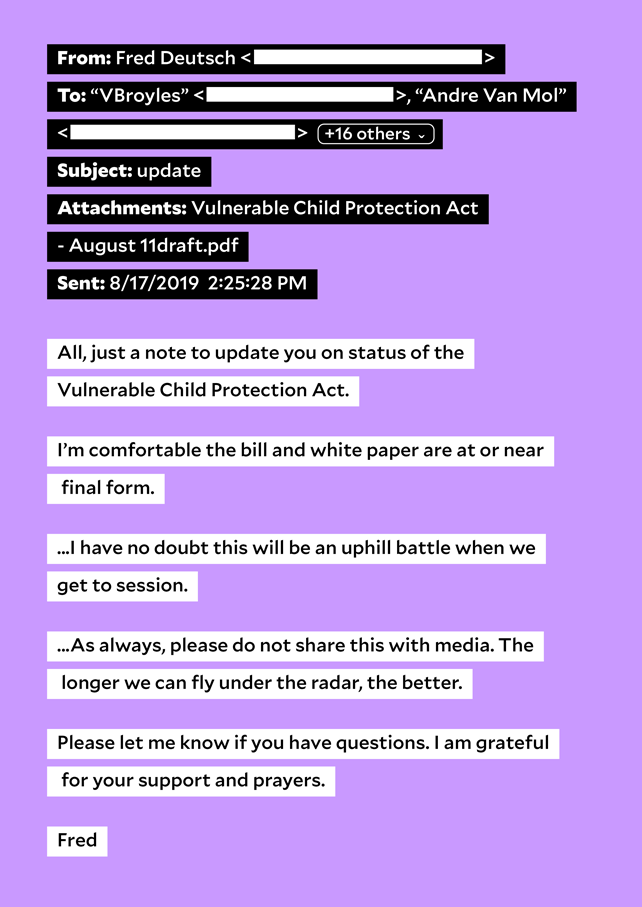
“It was like Deutsch assembled a team of Navy SEALs—we were all trained killers in a specialty,” says Elisa Rae Shupe, a retired US Army soldier who became a vocal anti-trans advocate and participated in Deutsch’s working group after detransitioning. Shupe has since retransitioned, disavowed much of her old activism, and shared her copies of the working group’s emails with reporters. Religious-right rhetoric about wanting to help children with gender dysphoria is “just a front for what they do behind the scenes,” she says. “It’s like they want to do as much damage to the trans community as they can.”
The draft bill Deutsch sent the group in August 2019 sparked a lengthy debate over language. In one email chain, participants struggled to narrow the wording of Deutsch’s bill to avoid blocking treatments for trauma victims, or legitimizing the concept of gender as one separate from biological sex. Katherine Cave, a founder of the anti-trans parent organization Kelsey Coalition, suggested specifying that treatments were only banned for patients who had an “incorrect perception of their sex.” A Child & Parental Rights Campaign lawyer proposed replacing the word “incorrect” with “dissonant.”
Richard Mast of Liberty Counsel separately advised the group to avoid saying the words transgender, cisgender, or non-binary. “Using them surrenders the language,” Mast wrote. “If the other side’s language frames the debate, we lose.”
Members of the South Dakota “team”—as they occasionally referred to themselves—hammered out talking points for upcoming bill hearings, where a detransitioner and a member of the Women’s Liberation Front would testify in favor of the bill along with doctors from both inside and outside South Dakota. The group debated how to respond to the ACLU’s claim that their bill was unconstitutional. (“While there may be a constitutional right to refuse to carry a child to term (under Roe), there is no constitutional right to chemically and surgically mutiliating one’s healthy body, where there is no disease to be treated—that is child abuse,” Broyles wrote.) And they brainstormed responses to the argument that gender-affirming care reduces suicide—an assertion that is backed up by research. Peer-reviewed studies have repeatedly found that trans and nonbinary youth with access to gender-affirming care are significantly less like to seriously consider suicide than those who did not receive such care. A larger analysis, using online survey data from over 11,000 trans and nonbinary youth, found using gender-affirming hormonal therapy was associated with lower rates of both depression and suicidality. Yet one team member called the argument that gender-affirming care reduces suicide “abusive”; another argued it was a way for doctors to coerce parents to consent to gender-affirming care for their child.
Van Mol, the doctor, suggested Deutsch reply to the suicide prevention argument with a rebuttal published on a defunct anti-trans blog: “Why weren’t the 1950s a total blood bath for suicides if non-affirmation of everything is the fast train to offing one’s self?” Van Mol asked, paraphrasing the blog post.
Another doctor in the working group, California endocrinologist Michael Laidlaw, had gained attention for his writing against gender-affirming care after parents at a charter school in his region raised complaints that they hadn’t been notified before kindergarteners were read a children’s book, I Am Jazz, about trans teenager Jazz Jennings. Last fall, when the state of Florida called on Laidlaw as an expert witness in a lawsuit over its anti-trans Medicaid policy, a federal judge concluded that he was “far off from the accepted view” on how to treat gender dysphoria, in part because Laidlaw had said he would refuse to use patients’ preferred pronouns. In his South Dakota testimony, Laidlaw compared gender-affirming care to Nazi experimentation and the Tuskegee Syphilis Study. In emails to Deutsch and the group, he railed against doctors who prescribe puberty blockers—which are used to delay unwanted physical changes in gender-diverse kids and give them more time to explore whether or how to transition—accusing them of “willfully harming” children, even if kids and their parents consent to treatment. “The physician is the criminal in these scenarios and must be prosecuted by the law,” he argued.
Around the time it became clear that Deutsch’s bill would not pass, the discussions on the email threads shifted from strategy to impassioned proclamations that trans people don’t exist. “The State is forcing people to participate in a lie akin to 2+2=5,” Cretella wrote. “[A] man is NOT a woman! If this is not the definition of insane I don’t know what is!” Some participants in the chains argued over whether it undermined their cause to work with a trans activist who opposed medical transition for children but not adults. “Their endorsements come with a hitch: they expect everyone to play make believe that they really are the opposite sex and have compelled pronouns and all that garbage,” Shupe wrote.
In spring 2020, the group claimed one victory. Mast, of Liberty Counsel, put the team in touch with Idaho Rep. Julianne Young, who was working on a bill to prohibit trans people from changing the gender marker on their birth certificate. Young, who had taken edits from ADF attorney Matt Sharp on the proposal, asked the group for feedback on its language and invited them to edit her press release about it. (In response to questions from Mother Jones, Young says that consulting with experts with legislation is a “normal part of our robust, democratic process.”)
On March 30, 2020, Young wrote to the group with excitement to announce that her bill had been signed by Idaho Gov. Little. “I can’t thank you enough for your help and support,” she wrote.
“Thanks for staying so focused on this even through the endless pandemic pandemonium,” replied Gary McCaleb, a lawyer on ADF’s appellate team. “Very, very well done!”
Even as Deutsch’s original bill failed, variations of the Vulnerable Child Protection Act were already being introduced in at least 9 states beyond South Dakota. In part, that was thanks to the efforts of people on the team, who were pushing the bill they’d workshopped with Deutsch behind the scenes to other Republican legislators.
In October 2019, Broyles announced to the group that she and Robbins had met with Georgia state Rep. Ginny Ehrhart and converted her to their cause. “She is filing our bill this legislative session,” Broyles wrote. “Am stoked for what God is doing in Georgia.” Not long after their meeting, the Atlanta Journal Constitution reported Ehrhart as saying she had drafted the bill in response to a high-profile child custody dispute in the Texas, in which parents disagreed about their child’s gender identity.
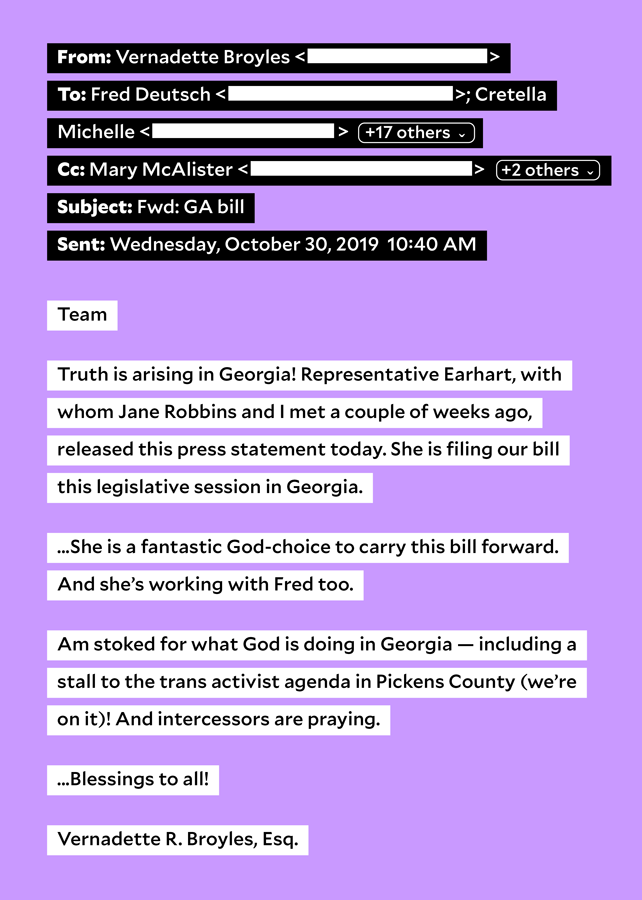
In Florida, an aide for state Rep. Anthony Sabatini contacted Mast for recommendations for experts who would speak out in support of a Vulnerable Child Protection Act there. Cretella helped collect names of like-minded doctors and psychologists, reporting to the group that she’d urged a lobbyist “to get a diversity of witnesses as was achieved for [South Dakota].”
Meanwhile, Eagle Forum worked with a Utah lawmaker, then-Rep. Brad Daw, who’d agreed to sponsor a similar bill in his state. “We’ve got lots of legislators working on this,” a Utah Eagle Forum activist told the Salt Lake Tribune. Deutsch told his group he would pass workshopped legislative language and supporting materials to Daw through Eagle Forum. But Daw, citing pushback from colleagues and the parents of trans children, later changed his mind, and instead filed a bill to study the effects of puberty blockers.
And in Alabama, according to an email from Eagle Forum’s Clarke, both Cretella and Deutsch had coached her as she led legislators in the state “to adopt a bill similar to Rep. Fred Deutsch’s.” The resulting legislation, dubbed the “Vulnerable Child Compassion and Protection Act,” failed in 2020 and the following year. But an updated version was signed into law in 2022, becoming the country’s second ban on gender-affirming care and the first to criminalize doctors who provided it. (The first, in Arkansas, was passed in 2021. Today, six states total have banned gender-affirming medication and surgical care for minors.)
After Alabama enacted its version of Deutsch’s bill, the Justice Department sued the state, arguing that the law is unconstitutional because it discriminates based on sex and transgender status. A federal judge agreed to block parts of the new law, explaining that Alabama had produced no credible evidence to back up its claim that the medications are experimental. “The uncontradicted…evidence is that at least twenty-two major medical associations in the United States endorse transitioning medications as well-established, evidence-based treatments for gender dysphoria in minors,” District Court Judge Liles Burke wrote in his order issuing a temporary injunction.
That case, along with a challenge to the Arkansas ban, is still playing out in court. Last fall, Burke denied a Justice Department attempt to subpoena the Eagle Forum for all documents related to its advocacy for the law. “Eagle Forum of Alabama took on this issue after hearing from citizens in Alabama, including parents, doctors, lawyers, and guidance counselors, about their concerns for otherwise healthy children who want to transition to the opposite sex,” the group claimed in a press release.
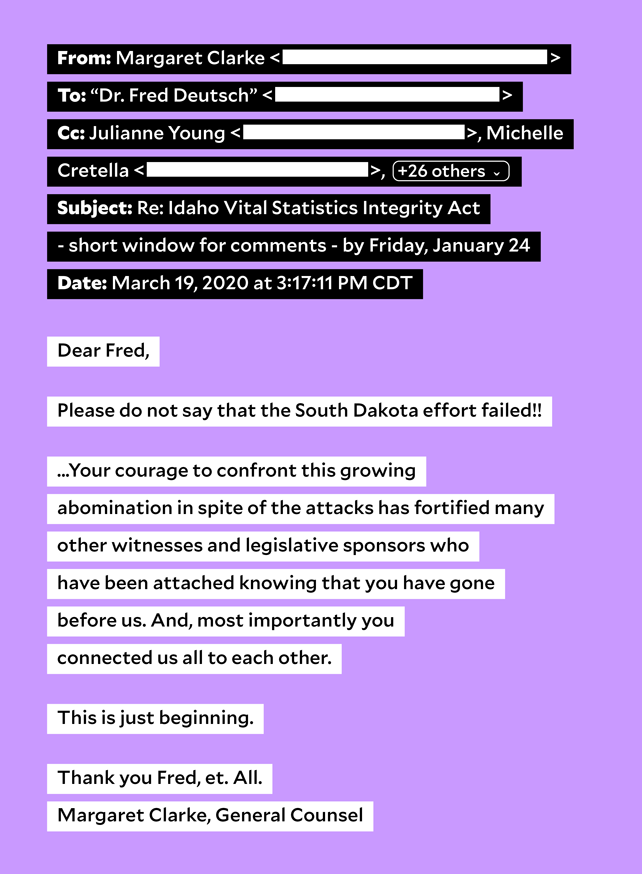
Read Clarke’s email, lauding Deutsch’s influence on anti-trans legislation, here.
And in South Dakota, Deutsch finally won the long battle this February, when Gov. Kristi Noem signed an updated version of his bill. The new law strips licenses from doctors who provide minors with gender-affirming care, and requires health care providers to gradually cut off puberty blockers and hormones for any kids they are already treating. That provision is expected to force some South Dakota teens to medically detransition by the end of 2023.
Deutsch returned to Twitter in February to celebrate the signing of the South Dakota ban. “This concludes the effort I began three years ago,” he tweeted, along with a picture of lawmakers toasting. “Many good people have worked to protect our children.”
